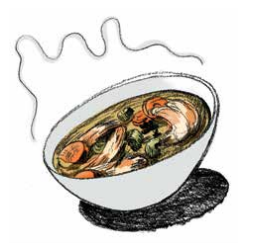Elizabeth Michaelson Monaghan
The Foremothers of Food Memoirs
If the inclusion of non-kosher recipes bothered some readers, others took a different tack. “For a restaurant critic of the New York Times to write about Jewish food was considered strange, because Jewish food was not [thought to be] very good,” Sheraton said. “There wasn’t a big market for Jewish cookbooks. It’s not a status cuisine.” Or at least it wasn’t 40 years ago.

Jewish food (then nearly synonymous with those Eastern European dishes) was maligned. It had “chicken fat, and was considered heavy, and greasy, there was a smell of onions and garlic, and I would guess most of the people who didn’t like Jewish food had had it at Jewish restaurants where it wasn’t served well,” Sheraton declared.
Because of this, “There was nothing on the jacket to indicate From My Mother’s Kitchen was about Jewish food. Today, Jewish cooking is huge, though Mediterranean and North African Jewish food” gets the most attention, Sheraton noted. Nonetheless, “If the book were to be reprinted, it would have to say something like, ‘Memoirs of Growing up in a Jewish American Kitchen’” on the cover.
Her latest book is 1,000 Foods to Eat Before You Die: A Food Lover’s Life List, from 2014. In both her work and in conversation with Lilith, Sheraton is authoritative, opinionated, and incidentally hilarious. On kale: “I believe it should be cooked long and slow, with fat.” She eats local when possible, but “I don’t think there’s anything wrong with selling Maine lobster on the West Coast.” Nor has she any objections to GMOs, “if it’s done responsibly and safely, and if it adds to the world’s food supply.”
Regarding current trends and controversies within the food world, Sheraton doesn’t like “no tipping” policies. “I think tipping is a useful way to ensure good service.” She believes cashless restaurants are elitist, and, in the wake of numerous #MeToo revelations coming out of the restaurant industry, Sheraton has a novel idea for penalizing establishments that fail to monitor and address proven sexual harassment: “The New York State Liquor Authority should be able to revoke or suspend a restaurant’s license.”
Sheraton does “really important, wonderful work,” says Arlene Avakian, professor emeritus in the Department of Women, Gender, Sexuality studies at University of Massachusetts at Amherst and the author of Through the Kitchen Window: Women Explore the Intimate Meaning of Food and Cooking. “Mimi Sheraton tells me something that I really want to know, and she sometimes puts it in an autobiographical frame.” For instance, from Sheraton’s The Bialy Eaters: The Story of a Bread and a Lost World, she learned “what bialys meant to people.”
Thanks to her breadth of knowledge, Sheraton carries an air of omniscience, I’ve discovered. Towards the end of my conversation with her, I recalled a sentence in From My Mother’s Kitchen: “If I could remember the precise moment that I began to love soup, and especially soup that is volcanically hot, I think I could mark the turning point from childhood to adulthood.” For the past 30-odd years, I’ve been waiting to love really hot soup. When I tell her that, Sheraton laughs: “I love soup for what it is, and I love to make soup. The thing I like about first courses is that they promise there’s more to come. I like beginnings, there’s a note of promise in that. I’m not so crazy about endings.”
The late novelist Laurie Colwin, who died in 1992, also saw more than superficial meaning in a meal. During her lifetime Colwin was best known for novels like Happy All the Time and Family Happiness. But today, her food writing—1988’s Home Cooking: A Writer in the Kitchen and More Home Cooking: A Writer Returns to the Kitchen (a collection of essays first published in Gourmet, released in 1993)—is considered especially influential. “I think of her as kind of a proto-blogger,” cookbook author, food journalist, and scholar Mitchell Davis told the New York Times in 2014.
In Colwin’s witty, stylish essays, which include plenty of kitchen disasters, “She took the topic of food and used it as a way to comment on life,” says Davis, chief strategy officer at the James Beard Foundation. “Colwin shared personal stories about personal things,” just as food bloggers do today. “She was like James Beard in that her work offered a kind of ongoing narration of culinary life that was part of her appeal…. She was an important figure in personalizing and neuroticizing food.” Which I feel is a compliment.
The Foremothers of Food Memoirs
The articles in this special section:
From M.D. to Baker, Beth Ricanati’s Memoir of Challah
Elizabeth Michaelson Monaghan
"When I started baking challah, I was stressed and unhealthy, as both a doctor and a mom. By making challah, I was able to reclaim some sense of self."
 Please wait...
Please wait...